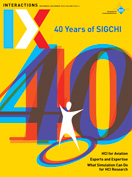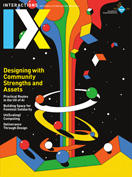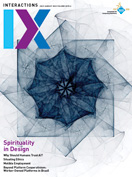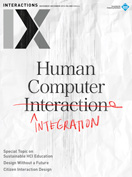Authors:
Elizabeth Furtado, Tayana Conte, Simone Barbosa, Paulo Melo, Cristiano Maciel, Cleidson de Souza, Tuomo Kujala
Since 2012, the Brazilian HCI community has been discussing its main challenges for the next decade [1]. One such challenge is to promote collaboration among educators, institutions, and practitioners to improve HCI education in Brazil. The rationale is that when HCI education is aligned with industry needs, HCI professionals will more easily be able to find suitable jobs. However, how should we present HCI to local industry in places where it is not yet widely known and has not yet been formally adopted? As a country that covers a large area of the South American continent, Brazil must struggle to promote the widespread development and communication of innovative and scientific advances in HCI research and practice. Indeed, the North, Northeast, and Midwest Brazilian regions have so far had less representation in national HCI workshops than other regions [2].
The Brazilian SIGCHI chapter, Br-CHI, has promoted a series of initiatives to disseminate HCI in these regions, with the intention of bringing industry and the academy together. We wrote a proposal to evangelize HCI and to discuss initiatives for the development of interactive systems and services with better usability and user experience. The project was approved and carried out with the support of SIGCHI, in particular Zhengjie Liu, former adjunct chair for developing worlds at SIGCHI.
With the project approved, a series of itinerant workshops was organized with the theme of Evangelization of HCI Research and Practice: Bringing Together Brazilian Universities and Industries. Each two-day workshop was conducted in a different city in the Brazilian North, Northeast, or Midwest. This allowed us to reduce some of the difficulties caused by the geographic dispersion of the participants and by their limited availability, as they could not be away from work for long.
Workshops also followed a similar format:
- Opening session: Research-related themes were discussed and participants shared common interests and challenges in order to strengthen the local learning of HCI. Participants learned about the role of relevant organizations such as ACM and SIGCHI.
- Course sessions: A local committee defined what they would like the workshop to address.
In each city, we identified more than 140 people from 10 different organizations interested in HCI, from which we expected to draw 100 participants per workshop. We attribute our success to the organizers' efforts in making the workshop attractive, especially to employees from the target industries who have time constraints. The idea was to have hands-on activities throughout the day and early evening. Furthermore, the local committee managed to balance industry needs and the research done in the universities when choosing the speakers (13 of them).
The events brought together different organizations related to HCI (SIGCHI and local universities), interaction design (IDF and IxDA), and user experience (UXPA), as well as R&D centers. We identified themes that interested them to provide courses and couple industry demands to the research done in the universities, which was one of the aforementioned challenges. We hope similar initiatives will arise and grow and will greatly benefit the Brazilian community.
1. Rosemberg, C., Boscarioli, C., Furtado, E.S., Silveira, M.S., Prates, R.O., Bim, S.A., Barbosa, S.D.J. HCI education and the market. In I GranDIHC-BR—Grand Research Challenges for Human-Computer Interaction in Brazil. M.C.C. Baranauskas, C.S. de Souza, and R. Pereira, Eds. CEIHC, 2015, 31–34.
2. Gasparini, I., et al. Vive la différence!: A survey of cultural-aware techniques in HCI. Proc of IHC 2013.
Elizabeth Sucupira Furtado is a professor of computer science at Unifor, Brazil. [email protected]
Tayana Conte is an associate professor at the Federal University of Amazonas, Brazil. [email protected]
Simone D.J. Barbosa is an associate professor of computer science at PUC-Rio, Brazil. [email protected]
Paulo Melo is business development manager at INDT, a Brazilian innovation institute. [email protected]
Cristiano Maciel is a professor of computer science at UFMT, Brazil, and a researcher at the Interactive Virtual Environments Laboratory. [email protected]
Cleidson R.B. de Souza is a senior researcher at the Vale Institute of Technology and an associate professor at the Federal University of Pará, Brazil. [email protected]
Copyright held by author
The Digital Library is published by the Association for Computing Machinery. Copyright © 2016 ACM, Inc.







Post Comment
No Comments Found